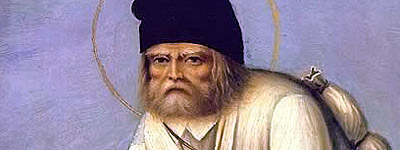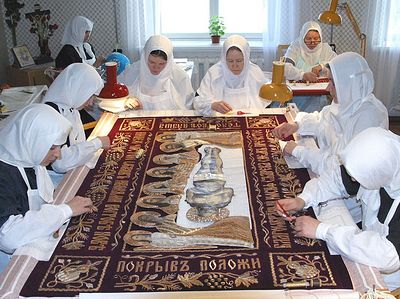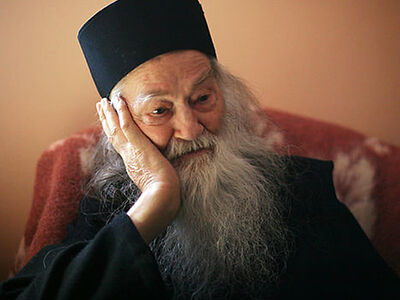One day a brother came to Abba Serapion. The Abba invited him pray and wanted to wash his feet, but the brother refused, calling himself sinful and unworthy. Then the Abba advised him not to go wandering around from place to place, but to remain in his cell. These words so angered the brother that his face even changed. Seeing this, the elder said to him, “You just called yourself sinful and unworthy of life itself, but as soon as I said something beneficial to you with love, you got angry (Patericon).
 The Pharisee and the Publican
The Pharisee and the Publican
This story is now centuries old, but the problem of false humility lives to this day. In our time also, Christians continue to exercise themselves in ostensible humility and demonstrate their spiritual ignorance. Taking their place in the in the “sinner’s queue” after the apostle Paul, believers generously pronounce all kinds of unflattering epithets aimed at themselves.
“Worms,” “swine,” “goats,” and all manner of “stinking dogs” step on each other to inform the whole world of their unworthiness, sincerely believing in their souls that this is that very sign of true humility. But all you have to do is nick their shaky vanity, disagree with their opinion—God forbid!—and not accept their advice, and all that feigned piety will immediately crumble into dust, to reveal the uncomely visage of self-delusion.
“False humility sees itself as humble: it is comical and pitiful to console oneself with this deceptive, soul-destroying spectacle.”1
What should the right path be like, and is it possible to distinguish between true and false humility, between the truly repentant sinner and the false one (if we can put it that way)?
Probably the first and most obvious signs of a sinner are sins. The apostle Paul tells us about this. Calling himself the “first among sinners,” he is not ashamed of his past excessive zeal and calls himself outright a “blasphemer, persecutor, and offender” of the Church (1 Tim. 1:13). That is, the awareness being a sinner is made possible by true experience of a sinful life, which everyone has, for there is no man which sinneth not (2 Chron. 6:36). Holy people considered not only deeds, but also any idle thought to be a betrayal and apostasy from God, even despite the fact that the time of crude sins is behind them. This is why after forty-seven years of severe desert life,  Venerable Mary of EgyptCovered by the cloak, the ascetic turned to Zosimas: “Why do you want to speak with me, a sinful woman? What did you wish to learn from me, you who have not shrunk from such great labors?”
Venerable Mary of EgyptCovered by the cloak, the ascetic turned to Zosimas: “Why do you want to speak with me, a sinful woman? What did you wish to learn from me, you who have not shrunk from such great labors?”
“>St. Mary of Egypt continued to think of herself as a great and accursed sinner.
“Though some have already received forgiveness of sins, for the sake of constantly pushing themselves toward humility of mind they nevertheless firmly remember their former sins, thereby rebuking vain arrogance.”2
Thus, a former sinful life always remains in the memory of believer. Not a detailed recollection of different sins, which is harmful to the soul, but the general negative experience serves just like the crock crow for Apostle Peter as a reminder to us of our unworthy life.
“There is no need to remember every sin individually, but we must always maintain an awareness of our sinfulness… However, if a person who is not known for his sensitivity sees pride rising up in himself, then it would not be bad if he would remember his sins, in order to humble himself.”3
Other distinguishing features of the true sinner (or of an authentically humble heart) is not comparing himself with others. We tend to compare ourselves with our neighbors. We do this almost unconsciously. We measure ourselves against them in prayers, fasts, prostrations, and alms; we compare our outer appearances, hairstyles, clothing, its cost, etc. We even compete in our closeness to our spiritual fathers and are jealous when it seems to us that he prefers someone else over us.
“The Pharisee syndrome,” which contrasts oneself against everyone around, flourishes wildly in us and exposes our false humility. In contrast to the Pharisee, the publican did not see anything around him. He stood one on one before God with his sins, asking only for mercy. Truly, whoever sees himself as sinful does not see the sins of others. He simply has not time for them, because he is completely engrossed in searching and minding his own heart. This is so obvious, just as every patient in the hospital suffers from his own pain and pays no attention to others’ diseases. If you wish to compare yourself with someone, then don’t measure yourself in piety against your neighbor, but against  St. Sergius of RadonezhUndoubtedly, the most outstanding establisher of the truly selfless “life equal to the angels” in fourteenth century Russia is St. Sergius of Radonezh, the founder of the famous Holy Trinity-St. Sergius Monastery, which embodies in its historical legacy his blessed precepts, and gradually became a kind of spiritual heart for all of Orthodox Russia.
St. Sergius of RadonezhUndoubtedly, the most outstanding establisher of the truly selfless “life equal to the angels” in fourteenth century Russia is St. Sergius of Radonezh, the founder of the famous Holy Trinity-St. Sergius Monastery, which embodies in its historical legacy his blessed precepts, and gradually became a kind of spiritual heart for all of Orthodox Russia.
“>St. Sergius of Radonezh,  St. Seraphim of Sarov“>St. Seraphim of Sarov,
St. Seraphim of Sarov“>St. Seraphim of Sarov,  St. John of KronstadtSt. John of Kronstadt”>St. John of Kronstadt, and others like them. This kind of comparison may even be beneficial to us.
St. John of KronstadtSt. John of Kronstadt”>St. John of Kronstadt, and others like them. This kind of comparison may even be beneficial to us.
Yet another distinguishing feature of the humble heart of a sinner is hiddenness. A humble person does not speak of himself as sinful. He simply feels this before God
“One must strive to have humility within,” counsels  St Tikhon the Bishop of Voronezh and Wonderworker of Zadonsk and All RussiaThe saint lived in very simple circumstances: he slept on straw, covered by a sheepskin coat. His humility was so great that he paid no attention to the workers who laughed at him as he walked about the monastery, pretending that he did not hear it. He often said, “Forgiveness is better than revenge.”
St Tikhon the Bishop of Voronezh and Wonderworker of Zadonsk and All RussiaThe saint lived in very simple circumstances: he slept on straw, covered by a sheepskin coat. His humility was so great that he paid no attention to the workers who laughed at him as he walked about the monastery, pretending that he did not hear it. He often said, “Forgiveness is better than revenge.”
“>St. Tikhon of Zadonsk, “and as with any piety, one has to have it in the heart. For God judges according to the heart’s intentions, and not according to externals, or how we appear to other people.”
On the long and painful path of coming to know one’s own weakness a person humbles himself to such an extent that he completely loses all hope in his own strength.
“Total submission to God is acquired by a person when he ascends to the highest degree of the knowledge of God and the knowledge of his own weakness.”4
“Wallowing in the abyss of sin,” and having come to hate sin with his whole soul, he now hopes only in God’s mercy, and sees his salvation as entirely a gift from above. Telling someone how sinful and accursed he is simply makes no sense. This suffered-through reality has become for the sinner his soul’s inheritance, the natural feeling of his heart. And in this hope in God the sinner ceases to be a sinner, because, “The sinner who reproaches his own sins becomes righteous through this very reproach of them.5
True humility is inalienably bound up with humble-mindedness, that is, humble thoughts about himself. “Do not think more of yourself than you should; but think soberly (cf. Rom. 12:3), the apostle Paul counsels the Roman Christians. This virtue is the exact opposite of humble talk, or speaking humbly about yourself, because it is performed in the temple of the heart, only before the eyes of God. The holy fathers tell us how valuable and important this is in a person’s spiritual life:
“When you will have humble-mindedness and will exercise yourself in thoughts of humility, the Lord will come to you in that moment, embrace and kiss you, give you the gift of the right Spirit in your heart, the Spirit of deliverance and forgiveness of sins, crown you with His gifts, and glorify you with wisdom and knowledge. For what is more loved by and pleasant to God than a heart that is contrite and humble, and mind that humbles itself.”6
Humble-mindedness is what we now critically lack. A cult of human selfishness is being pushed in all spheres of our existence. “You can achieve everything yourself” (even more applicable to females), “self-healing,” “self-realization,” “self-achievement,” and so on. The prefix “auto” has firmly entered into our daily life. “Don’t stress yourself, don’t limit yourself, experiment, you are worth it,” is what is inculcated in us from the TV screen and from consumer packaging. Social lions and lionesses never present themselves modestly. That is considered dangerous in the modern, competitive world. “If you show weakness you’ll be destroyed,” thinks modern progressive humanity. People are perceived as competitors, and children as a hindrance to self-realization.
If we take a closer look, we will notice that God with His qualities and commandments is completely absent from this system of human deification. Christ’s humility is perceived as weakness and not strength, mighty to work miracles, as it itself is a miracle. The humble person is strong in spirit, like a lion. And with his “forgive me” alone he can disarm any giant. He does not fear changes or anything else; he is not embarrassed by criticism, is at peace when deprived, resolute in doing good, and wise from God in all his initiatives.
Besides that, a real sinner does not give out advice (especially if no one asks him for it). He in general prefers silence and introspection, because this is the inalienable characteristic of a humble heart.
“As opposed to ambition, which scatters a person’s thoughts all over the universe, humility concentrates them in the soul… leads to fruitful and deep self-knowledge, to mental hesychia.”7
Just the same, when asked, he prays and says what’s beneficial to the asker, because in this is also love of neighbor.
We now have such a disposition that when we walk past people and hear their conversation, we unfailingly stop and put in our two cents. And this we do despite the fact that we not only do not understand the topic of the conversation, we don’t even know those people. And if those people are also arguing, then caught up in the energy of the argument and the emotions of the speakers, we even more eagerly enter into the discourse, especially if we have something to say. Having had our say, we walk away from them all worked up with anger (after all, no one cares about our opinion) and empty. And, regardless of our troubled conscience and inner disappointment, we just go on as if nothing happened and consider ourselves to be humble sinners. But truly “humble is he who preserves silence, who considers himself to be nothing, is not inclined to arguments, and submits himself to all… Who distances himself from idle conversation, does not contradict his elders… who does not insist on his own opinion… and angers no one.”8
In conclusion we say: Humility is not a human invention. It is a Christlike quality. Learn of Me; for I am meek and lowly in heart (Matt. 11:29). We can’t somehow give birth to it, produce it, or train ourselves in it. It is ineffable and is given only to those who labor at it correctly, who “strive lawfully” (cf. 2 Tim. 2:5)—and at that not quickly. Humility is “inexplicable by earthly words or language. It is incomprehensible to the fleshly mind, is ineffably comprehended by the spiritual mind, and once comprehended, it abides incomprehensibly.”9 It is important for those who like to “humble around” before people to direct their attention to the fact that the Lord is humble precisely in heart, and not in words. And the humility of his heart did not prevent Him from making a whip from cords and casting the sellers out of the temple (Jn. 2:15); it did not prevent Him from becoming wrathful when they didn’t allow the children to come to Him (Mk. 10:14), or calling the servant to answer for striking Him on the face (Jn. 18:23).
“True humility says no humble words, neither takes on humble looks, nor forces itself to think humbly about itself, and does not humble itself by denigrating itself—although all of these are beginnings, manifestations, and various forms of humility; but humility itself is a grace and gift from above.”10
In a word, we know nothing about true humility, but we still try to imitate the outward actions of the saints, for whom the external was the result of the internal. But we are nevertheless obligated to follow the path of acquiring it, because this is the Savior’s direct commandment, which can bring us God’s mercy; for it is said, I was humbled and the Lord saved me (Ps. 114:5).






 Primate of Church of Czech Lands and Slovakia expresses position on events in UkraineOn October 11, 2018, in his letter to His Holiness Patriarch of Kirill and All Russia, His Beatitude Metropolitan Rostislav of the Czech Lands and Slovakia assured him of his unwavering position in regard to the ongoing gross interference of the state authorities in the internal life of the Church in Ukraine.
Primate of Church of Czech Lands and Slovakia expresses position on events in UkraineOn October 11, 2018, in his letter to His Holiness Patriarch of Kirill and All Russia, His Beatitude Metropolitan Rostislav of the Czech Lands and Slovakia assured him of his unwavering position in regard to the ongoing gross interference of the state authorities in the internal life of the Church in Ukraine. Head of Czech-Slovak Church condemns persecution of Ukrainian ChurchNeither God nor history will forget the modern Golgotha of the Ukrainian Orthodox Church—the persecution of its clergy and the mockery of the faithful.”>speaking out against the persecution of Orthodox Christians in Ukraine.
Head of Czech-Slovak Church condemns persecution of Ukrainian ChurchNeither God nor history will forget the modern Golgotha of the Ukrainian Orthodox Church—the persecution of its clergy and the mockery of the faithful.”>speaking out against the persecution of Orthodox Christians in Ukraine. 
 Venerable Mary of EgyptCovered by the cloak, the ascetic turned to Zosimas: “Why do you want to speak with me, a sinful woman? What did you wish to learn from me, you who have not shrunk from such great labors?”
Venerable Mary of EgyptCovered by the cloak, the ascetic turned to Zosimas: “Why do you want to speak with me, a sinful woman? What did you wish to learn from me, you who have not shrunk from such great labors?” St. Sergius of RadonezhUndoubtedly, the most outstanding establisher of the truly selfless “life equal to the angels” in fourteenth century Russia is St. Sergius of Radonezh, the founder of the famous Holy Trinity-St. Sergius Monastery, which embodies in its historical legacy his blessed precepts, and gradually became a kind of spiritual heart for all of Orthodox Russia.
St. Sergius of RadonezhUndoubtedly, the most outstanding establisher of the truly selfless “life equal to the angels” in fourteenth century Russia is St. Sergius of Radonezh, the founder of the famous Holy Trinity-St. Sergius Monastery, which embodies in its historical legacy his blessed precepts, and gradually became a kind of spiritual heart for all of Orthodox Russia. St. Seraphim of Sarov“>St. Seraphim of Sarov,
St. Seraphim of Sarov“>St. Seraphim of Sarov,  St. John of KronstadtSt. John of Kronstadt”>St. John of Kronstadt, and others like them. This kind of comparison may even be beneficial to us.
St. John of KronstadtSt. John of Kronstadt”>St. John of Kronstadt, and others like them. This kind of comparison may even be beneficial to us.  St Tikhon the Bishop of Voronezh and Wonderworker of Zadonsk and All RussiaThe saint lived in very simple circumstances: he slept on straw, covered by a sheepskin coat. His humility was so great that he paid no attention to the workers who laughed at him as he walked about the monastery, pretending that he did not hear it. He often said, “Forgiveness is better than revenge.”
St Tikhon the Bishop of Voronezh and Wonderworker of Zadonsk and All RussiaThe saint lived in very simple circumstances: he slept on straw, covered by a sheepskin coat. His humility was so great that he paid no attention to the workers who laughed at him as he walked about the monastery, pretending that he did not hear it. He often said, “Forgiveness is better than revenge.”
 On the Virtue of PatienceDear brothers and sisters, there is nothing we more often encounter in life than misfortunes and sorrows! What should we do amidst all these misfortunes in order to keep ourselves from harm, to not be conquered but to become conquerors?
On the Virtue of PatienceDear brothers and sisters, there is nothing we more often encounter in life than misfortunes and sorrows! What should we do amidst all these misfortunes in order to keep ourselves from harm, to not be conquered but to become conquerors? “Despair is for Those Who Are Attached to the Material”Elder Justin (Parvu; 1919-2013) was one of the most famous Romanian spiritual fathers. We present here several of his spiritual counsels, gathered from various publications.
“Despair is for Those Who Are Attached to the Material”Elder Justin (Parvu; 1919-2013) was one of the most famous Romanian spiritual fathers. We present here several of his spiritual counsels, gathered from various publications.